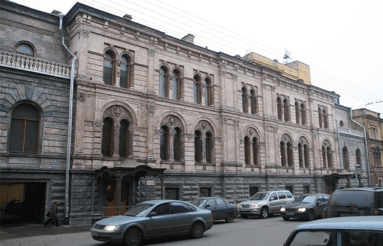August 31st, 2018

The European University at St. Petersburg (Yevgeny Asmolov/TASS)
A headline in a recent article in the New York Times reads “In Russia, a Top University Lacks Just One Thing: Students.” Said institution is the European University at St. Petersburg.
Like it’s counterpart, the Central European University (CEU) in Budapest, the European University at St. Petersburg, founded in 1994, is experiencing similar problems. In the case of the European University, it is the target of attacks from Russia’s reactionary, nationalist forces. As was the case for CEU in its early years, the European University received generous funding from the George Soros Open Society Foundations. It also received funding from the Ford and MacArthur Foundations. And, besides their large endowments and top-notch faculty, the European University is recognized for its outstanding reputation as a research institution. (For more on the CEU, click here)
The troubles for the European University started in mid-2017 when it lost its license over minor building code violations, specifically, plastic windows which were temporarily left outside the building. The building, known as the Small Marble Palace, was built in the 18th century in the Italian Renaissance architectural style and designated a historical landmark. In late December 2017, the university was forced to vacate the premises and moved to a less than impressive building across the street. Critics say the university is being targeted for political reasons because of its liberal curriculum in social sciences and humanities.
Having lost its teaching license, the next obvious casualty were the students who were forced to leave and continue their education elsewhere. In the meantime, the university set off on a frantic search for top-level officials in the Russian government to plead its case and have its teaching license reinstated. Even with support from President Vladimir V. Putin who signed three resolutions ordering officials to support the university, the doors of the campus remain shut and the lecture halls empty of students.
The European University is not the only institution targeted by the nationalists. According to the New York Times, “Last month, the Russian government revoked the accreditation of the Moscow School of Social and Economic Sciences, another highly regarded Western-oriented institution.” The growing influence of Russia’s nationalists has spelled trouble for the European University and any institution seen an intolerable outpost of Western liberalism.
In the New York Times article, Vladimir Y. Gerlman, one of Russia’s leading political scientists is quoted as saying: “The European University’s problem is that it is European. The set of principles followed by our school — academic freedom, self-organization, and international openness — is the opposite of the one followed by today’s Russia: centralized control, power vertical and isolationism. We are not compatible with these principles.”
Immediately following the collapse of the Soviet regime, the European University was set up in 1994 in an effort to stop the brain drain and bring together Russia’s leading scholars in social sciences and humanities with a style of teaching modeled after Western universities which encourage critical thinking and freedom to choose their fields of study.
The university built an impressive cadre of Russian academics who had been teaching at leading universities in the U.S.A. and the United Kingdom. Alongside its permanent faculty, the university regularly invited guest lecturers from abroad. In 2016, it was even named the school the top research university in the country, surpassing the highly respected Moscow State University.
Even with the appointment of a new education regulator who after a survey of the building concluded that the university had not violated any building codes and approved to have its teaching license granted this month so that it can reopen in October, the European University’s troubles have not disappeared. Promises of having its teaching license reinstated were made on and off in the past year and a half and each time it led to disappointment.
The future of the European University at St. Petersburg is uncertain. The question will be if students will return in October, that whether the teaching license will not be revoked just when the University prepares to open its doors.
You may ask what has become of the Small Marble Palace, the university’s former home? The Moscow Times reports that the vacated palace will house a new digital technology academy.
For more detail on the Kafkaesque treatment of the university by the Russian authorities, we highly recommend the links to articles provided below:
https://www.nytimes.com/2018/08/26/world/europe/european-university-st-petersburg-russia

The Academic Credentials Evaluation Institute, Inc. (ACEI), was founded in 1994 and is based in Los Angeles, CA, USA. ACEI provides a number of services that include evaluations of international academic credentials for U.S. educational equivalence, translation, verification, and professional training programs. ACEI is a Charter and Endorsed Member of the Association of International Credential Evaluators. For more information, visit https://acei-global.org/.


